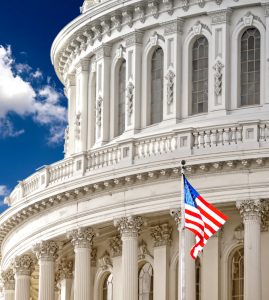
U.S. House of Representatives committee leaders Steve Womack (R-AR) and Rodney Davis (R-IL) on March 4 cited new Congressional Budget Office (CBO) cost estimates for a sweeping Democratic-sponsored election and campaign finance reform proposal that they said would represent an irresponsible use of taxpayer dollars.
The CBO on March 1 released a cost estimate on the For the People Act of 2019, H.R. 1, which would expand Americans’ access to the ballot box, reduce the influence of big money in politics, and strengthen ethics rules for public servants, according to the congressional record summary.
“As Democratic leaders look to advance H.R. 1, I caution my colleagues on both sides of the aisle to consider the dangerous precedent this proposal sets, not only for our budget, but for the future of our democracy,” said Rep. Womack, ranking member of the U.S. House Budget Committee.
The CBO, at the request last month of Reps. Davis and Womack, estimated that H.R. 1 would authorize the federal appropriation of about $2.6 billion over the 2019-2024 fiscal years and that implementing such provisions would cost $2.4 billion over the same period.
“Democrats knew this score would be an outrageous number and took steps to modify it purely for the purposes of hiding costs from the taxpayers, instead of taking the necessary steps to reduce the cost of H.R. 1,” said Rep. Davis, ranking member of the U.S. House Administration Committee.
The CBO also said the office “has not completed an estimate of some of the bill’s provisions with costs that are subject to annual appropriations, but expects those costs would total tens of millions of dollars,” according to its report.
The result of this inaction, Rep. Davis said, means the CBO actually “has underestimated a costly piece of legislation by not projecting the future costs to the detriment of the American taxpayer.”
H.R. 1, sponsored on Jan. 3 by U.S. Rep. John Sarbanes (D-MD), currently has 236 Democratic cosponsors and zero Republican supporters. The CBO summary of the bill notes that the proposal “would amend and reform federal statutes governing voting rights, elections, election security, campaign finance, lobbying and ethics, among numerous other provisions.”
“The CBO confirmed what we already know: H.R.1 upends the core tenets of our electoral system – taking power away from states and local communities, restricting the constitutional rights of voters, and forcing taxpayers to subsidize candidates that the public may not support,” Rep. Womack said.
The Arkansas lawmaker added that the CBO report also shows the “legislation leaves the door open for lawmakers to direct billions of dollars toward publicly financed campaign contributions and the government-run infrastructure to support them.”
Both Davis and Womack sent a joint Feb. 21 letter to CBO Director Keith Hall requesting the office’s cost estimate.
House “members on both sides are concerned about what this all-encompassing legislation could mean for their individual districts and states,” they wrote. “To help Congress ensure that the American people are well-informed, we request the CBO provide a cost estimate of the bill as soon as possible.”
The CBO complied with the request and quickly turned around the release of its report in light of U.S. House Speaker Nancy Pelosi, the lead original cosponsor of H.R. 1, pressing for a quick House vote on the measure.
On March 4, H.R. 1 had been amended by the House Administration Committee and then subsequently discharged from the nine other committees considering the bill.
“H.R. 1 is a costly bill that federalizes the nation’s election system, weakens safeguards to voting and registration practices that open the door to fraud, attempts to limit free speech, and creates taxpayer subsidies to finance politicians’ campaigns,” Rep. Davis said. “Regardless of what they disguise it as, make no mistake that the position of Democrats is to fund politicians’ campaigns using taxpayer funds.”
The Illinois congressman added that the greatest threat to the nation’s election system is partisanship.
“I strongly encourage my colleagues on both sides of the aisle to vote against H.R. 1 and instead work together in favor of a bipartisan effort to improve our election system,” he said.



